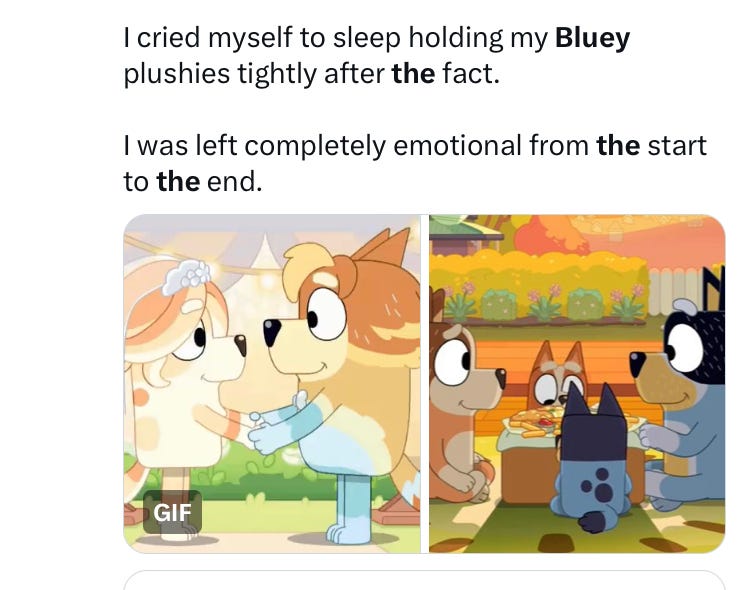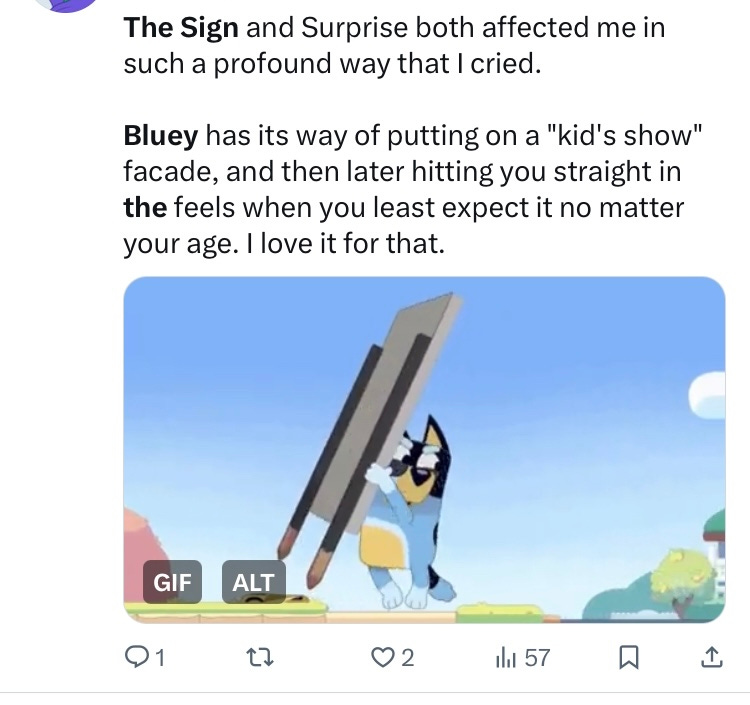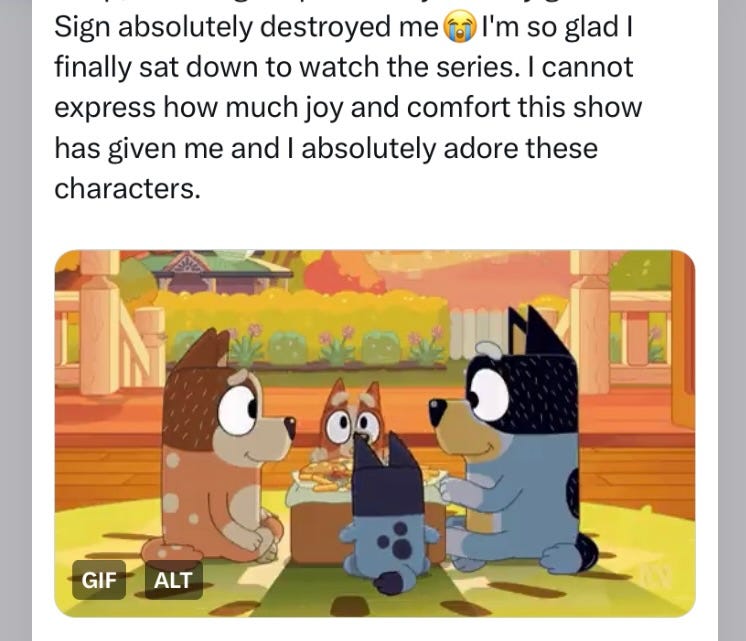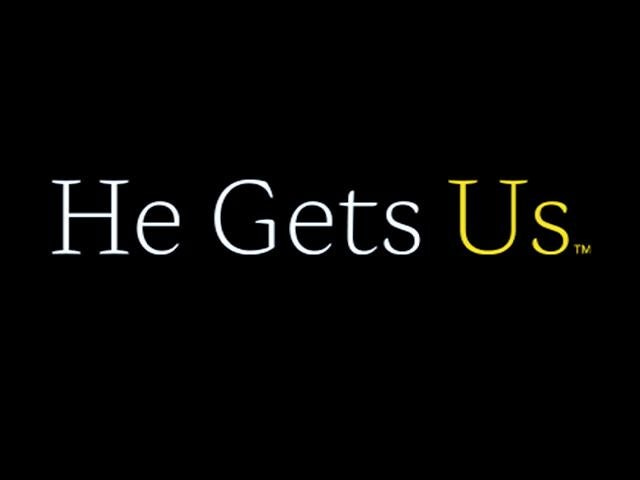So, there I was, biding my time like a strategic mastermind, patiently awaiting the arrival of my four energetic nephews and nieces. Not because I had missed them dearly or wanted to bond with them—no, my motive was far more cunning. You see, the latest episode of "Bluey" was causing a commotion across the internet, and I needed a child-sized accomplice or two to justify my viewing. As the episode finished I hugged a child tightly and hid the tears from everyone in the house.
"Bluey," is a now legendary cartoon that revolves around an energetic Heeler dog named Bluey, living with her family—Mum, Dad, and little sister, Bingo. Bluey's boundless energy fuels imaginative games that involve her family and friends, resulting in unpredictable funny authentic stories that are considered standout children's television.
The show premiered in 2018 and quickly gained popularity for its endearing characters, charming animation, and heartwarming storytelling. The creation of Aussie filmmaker Joe Brumm, it was apparently inspired by “Peppa Pig” but with an Australian twist. (I’ve no idea why that sentence made me think of smoky bacon).
In one popular episode, Bluey and her sister Bingo discover a magical xylophone that can apparently freeze people in place. The girls use it to play pranks on their dad, Bandit, who finds himself frozen in amusing poses throughout the day. Of course, there is no such thing as a magic xylophone and the dad is merely engaging lovingly with his kids in a pure and refreshing way. It showcases the playful and imaginative nature of family life, as well as the bond between parents and children.
To say "Bluey" is popular would be an understatement. In March this year it averaged a BILLION Minutes watched per week for the 13th consecutive week. The series’ first 28 minute special, titled “The Sign,” made its Disney+ debut in April and had 10.4 Million views by the end of the week, smashing all kinds of records.
It's interesting to me just how popular "Bluey" has become due to the human moments (disguised as dog moments) that tap into deeper, almost spiritual themes.
In the smash hit “The Sign” the Heeler home is up for sale and Bluey’s unhappy because she doesn't want to move home. But she is comforted when her teacher Calypso tells her a proverb about a farmer who trusts everything will turn out the way it’s meant to be.
The proverb is about a farmer whose horse runs away but returns with a wild horse, initially seen as good luck. When his son breaks his leg trying to tame the wild horse, it's viewed as bad luck. However, when a war breaks out and the son is spared from conscription due to his injury, it seems fortunate again. Through it all, the farmer's response, "we’ll see?" when each event is described as lucky or otherwise.
The rest of the episode runs like a real life outworking of the proverb. Through the story Bluey's distress over potentially moving from her home, leads to a series of events where the family confronts the idea of change. Ultimately, through various twists and turns, including a (SPOILER ALERT) cancelled sale and a change of heart, they decide to stay, celebrating their home with joy and laughter as the story concludes.
It sounds simple but “The Sign” plays out like a Spielbergian emotionally wrecking masterpiece. I haven't felt that broken since the ending since Marley and Me. As one social media comment put it so well, “it hit me straight in all the feels.”
At the heart of "Bluey" is a profound portrayal of the beauty of the human experience.
Here’s one example of a scene from “The Sign” episode:
Throughout the special, the dad Bandit remains convinced that relocating the family to a new city for his new job would be beneficial, offering them greater opportunities. However, it's not until the end that he begins to question whether this move is truly in their best interests, leading him to openly discuss his doubts with his wife Chilli.
Bandit: ...am I making a mistake?
Chilli: Probably...
(Bandit sags; she grabs his hand in comfort)
Chilli: …but let's make it together.
(The two smile affectionately at each other, holding hands as their tails wag).
Give them all the Oscars now!
Ultimately, the episode suggests the importance of trusting in a plan beyond our understanding, acknowledging that life's events—whether perceived as good or bad—may be part of a larger purpose. In life, we have to learn to trust. This is more than a platitude it is a deeply spiritual concept.
While connecting a deep faith analogy here might feel too convoluted, especially given Christianity's different perspective on luck, what's interesting to note is how much people are appearing to find a spiritual outlet through watching a Kid’s show.
When we watch “Bluey” we can identify with the ups and downs of parenting and family life. People are seeking to resonate with an expression of the human experience that enables them to say, 'That's just like me.' They desire a sense of validation, making them feel less alone, better represented, and more understood.
“Bluey” gets us.
It feels like people are desperate to resonate with everyday human experiences that can touch them on a profound emotional level. They long for that which helps them foster appreciation for the meaningful things in life.
I wonder if part of this is due to the changing nature of society and the yearning for nostalgic family values?
In his smash-hit book "The Anxious Generation," Jonathan Haidt explains how the decline of free-play in childhood and increased smartphone use among children and teens has contributed to rising mental distress. The book, which I am currently steeped in, outlines how the shift, from offline freedom to online life, has had a profound impact on sleep, addiction, and overall well-being. As Haidt puts it:
The shift from "play-based" to "phone-based" childhoods is making our kids sick and miserable.
We now belong to a culture characterised by stress, busyness, and disconnection, which is ultimately impacting mental health and happiness in negative ways.
If this is true then no wonder "Bluey" helps people when they are feeling so er…blue.
"Bluey" emphasises the joy of being present in the moment and finding meaning in everyday experiences. Perhaps in this world where playfulness, curiosity, and being present are no longer valued, people are experiencing a lack of joy and fulfilment in their daily lives? They long for re-connection and re-enchantment. This is now the context in which we have to re-engage people with the Christian faith.
This may be an interesting starting point to think about how we share the good news of Jesus with those that don’t yet know him.
My friends from ‘Start to Stir’ advocate for capturing the spiritual longings of a person’s heart to point them to evidence that they have a soul:
“Buried below the surface, every person possesses longings that point to the presence of a soul. We can start by stirring these longings to the surface and to guide people into a relationship with the God their souls long for.”
Could even watching "Bluey" be a starting point to stir spiritual curiosity?
Just as "Bluey" seems to have captured the cultural attention due to its authentic expression of humanity, there is a current Christian advertising campaign in America that is taking a similar approach.
It seeks to start with humanity and open up a doorway to curiosity.
The 'He Gets Us' marketing campaign was created to inspire cultural change in the way people think about Jesus and his relevance in their lives. Their YouTube Channel smashed through 100 Million views in the first four weeks of launch, making it one of the most successful digital outreach campaigns ever.
Their purpose is to help modern sceptics realise the humanity of Jesus. They champion messages like:
“We all deal with rejection. Whether you’ve been turned down for a job, ghosted after a first date, or even cast out by your own family, Jesus understands. He dealt with rejection, too.”
“If you’re struggling to make ends meet, you’re not alone. Even Jesus was born into poverty, and he struggled day-to-day to put food on his table.”
“Shame. Humiliation. Fear. A hollow sadness. If you’ve ever been bullied, mocked, or harassed, you know these feelings well. What you may not know is that Jesus knew them too.”
Although controversial to some due to its narrow focus and its enormous Super Bowl Ad budget, the 'He Gets Us' campaign has sparked a wave of conversations about who Jesus is among a generation that may otherwise not engage with him.
The campaign leverages relatable anecdotes and experiences to humanise Jesus and present him as someone who understands modern struggles and challenges. It uses storytelling to bridge the gap between scepticism and faith.
While there may be valid critiques of presenting a view of Christ that over-emphasises his humanity over his divinity, it is worth considering how this approach presents an entry point for the good news in a manner that breaks through cultural myths and barriers surrounding religion. It’s about finding new starting points.
As the creator of 'He Gets Us' said:
“There is only one way to God, but there are a thousand ways to Jesus.”
Perhaps churches can take a lesson from the spirit of "Bluey" as they think about how to connect with a new generation? How would Jesus speak to these viewers of "Bluey" who have no religious background or connection?
Where would Jesus start with people? Where can we?
‘He Gets Us’ Campaign image
The question is whether or not we as Christians are helping spark spiritual curiosity or hindering it. Watching "Bluey" might prompt us to ask some questions you never thought would come from a cartoon about a small blue dog:
If people are longing to recapture a sense of connection, then how can we help them feel like they can connect?
How do we help people resonate with the humanity of the Jesus-story and meet them where they are?
How can we encourage curiosity, playfulness, and a sense of wonder again?
At the end of the day as Christians we have a message so much better than 'we'll see,' as we become those that declare, 'come and see'. As we stir curiosity we can move beyond evoking ‘all the feels’ to changing lives for eternity.
How can you show others “The Sign?”
PS: What do you think about "Bluey"? Have you seen the 28-minute episode yet?










Makes me want to watch with the kids. Although I’ve been seeing a lot of emotional memes from Bluey